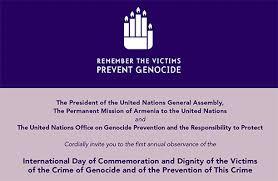
Secretary-General's Message for 2016
As we mark the second International Day of Commemoration and Dignity of the Victims of the Crime of Genocide and of the Prevention of this Crime, we pay tribute to the memory of the victims and reaffirm our pledge to prevent such atrocities.
Decades have passed since the adoption of the Convention on the Prevention and Punishment of the Crime of Genocide on 9 December 1948. Yet we continue to be confronted with extreme acts of violence against individuals and communities simply because of their national, racial, religious or ethnic identity.
I am gravely concerned about the rising hostility and prejudice against immigrants and those labelled outsiders. There can be no place for exclusionary or superior views of identity, or for divisive attempts to separate people into “us and them”. We have seen in the tragedies of history where this dark path can lead.
Member States and the international community must honour the suffering of the victims of genocide, and of their families, by working even harder against expressions of hatred, intolerance, racism and xenophobia. Let us spare no effort to uphold our moral and legal responsibility to protect populations against genocide.
Background
from http://www.un.org/en/events/genocidepreventionday/background.shtml
The Genocide Convention (article 2) defines genocide as "any of the following acts committed with intent to destroy, in whole or in part, a national, ethnical, racial or religious group … ", including:
- Killing members of the group;
- Causing serious bodily or mental harm to members of the group;
- Deliberately inflicting on the group conditions of life calculated to bring about its physical destruction in whole or in part;
- Imposing measures intended to prevent births within the group;
- Forcibly transferring children of the group to another group.
The Convention confirms that genocide, whether committed in time of peace or war, is a crime under international law which parties to the Convention undertake “to prevent and to punish” (article 1). The primary responsibility to prevent and stop genocide lies with the State.
Prevention of Genocide:
To prevent genocide and genocidal conflicts, it is critically important to understand their root causes. While conflict has many causes, genocidal conflict is identity-based. Genocide and related atrocities tend to occur in societies with diverse national, racial, ethnic or religious groups that are locked in identity-related conflicts. It is not simply differences in identity, whether real or perceived, that generate conflict, but the implication of those differences in terms of access to power and wealth, services and resources, employment, development opportunities, citizenship and the enjoyment of fundamental rights and freedoms. These conflicts are fomented by discrimination, hate speech inciting violence and other violations of human rights.
In terms of prevention, the critical step is to identify the factors (discriminatory practices) in a given situation that lead to or account for acute disparities in the treatment of a diverse population, and to seek ways to diminish and eventually eradicate these possible causes of genocidal violence. Given that no country is perfectly homogeneous, genocide is a truly global challenge.
Responsibility to Protect:
At the 2005 World Summit, Member States committed to protect their populations from genocide, war crimes, ethnic cleansing and crimes against humanity, as well as their incitement. They agreed that when States require assistance to fulfil that responsibility, the international community must be ready to assist them and, when States manifestly fail to protect their populations from those crimes, the international community must be ready to take action, collectively, in accordance with the United Nations Charter. Intervention only happens when prevention fails. Therefore, prevention is the basis of the principle of the responsibility to protect.
These three pillars of the responsibility to protect are articulated in the Outcome Document of the World Summit (A/RES/60/1, para. 138-140) and formulated in the Secretary-General's 2009 Report (A/63/677) on Implementing the Responsibility to Protect. The political commitment made by Member States in 2005 is deeply rooted in international law, including the Genocide Convention.
The Special Advisers on the Prevention of Genocide and the Responsibility to Protect:
The Special Advisers on the Prevention of Genocide and on the Responsibility to Protect work together to advance national and international efforts to protect populations from genocide, war crimes, ethnic cleansing and crimes against humanity, including their incitement. One of their main tasks is to collect information on situations where there may be a risk of genocide, war crimes, ethnic cleansing and crimes against humanity, based on the risk factors outlined in the Framework of Analysis for Atrocity Crimes. Due to the sensitive nature of their mandate, much of the Office’s work remains outside of the public eye. However, when the Special Advisers assess that making their concerns public will reduce the risk of atrocity crimes in a specific situation, they do so by issuing public statements and, upon request, by briefing the Security Council.
More resources
http://www.un.org/en/events/genocidepreventionday/resources.shtml










Add new comment